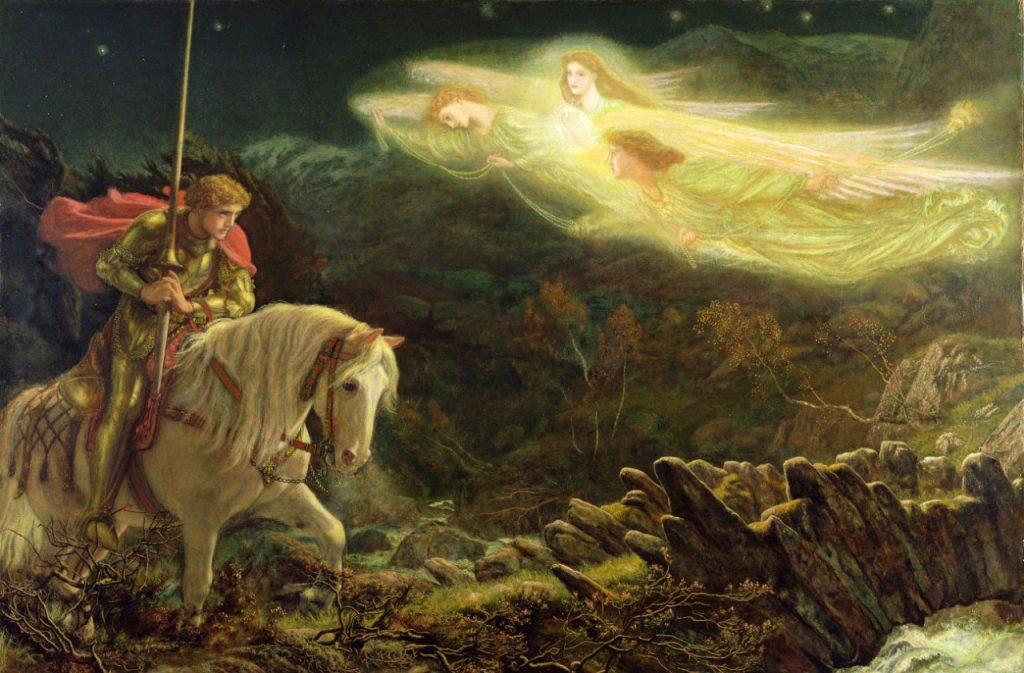
I’ve been slowing working through the transcendent Le Morte D’Arthur, by Thomas Mallory. This is my second read-through, and it is hard to overstate how beautiful, confounding, and remarkable it is.
One remarkable read that I think is present in the text is that all of this story, the Round Table, Arthur, Launcelot, Tristram, Palomedes, has been created with one singular purpose, unknown to anyone involved. The most worshipful knights, the wisest counselors, and the most glorious court in all of Christendom has come to be because it alone has the chance of producing the most important person possible: Galahad.
Camelot sets the groundwork for Galahad to come, and once he comes (and goes) Camelot collapses into the ruin of history.
The single figure of Galahad, and his quest for the Holy Grail, seems to be the purpose of this entire society, this entire culture, this entire book.
And when the fateful gears start turning, things get weird.
A woman speaks, though she has never spoken before, prophesies Galahad, and then dies, as if the glory and strength of the reality of Galahad was too much for a human to bear witness to. Entire countrysides collapse into destruction when the first rumbles of The Grail begin to sound. Angels start appearing, demons too, and everything begins to fall into catastrophe, or clarify into a more unified purpose.
Suddenly, a book that has previously been remarkably realist, remarkably grounded in clear, human (and surprisingly modern) customs and convictions, is skyrocketed into layers of heavy symbolism. Or, perhaps to put it better, you suddenly are able to see the symbolic frame governing all human interaction. Galahad does not change the stakes as much as reveal them.
Castles previously overtaken to win worship and succour the helpless are now shown to be not just the job of a knight, but of eternal significance. The knight is Christ, the castle is Hell, the captives are the souls of the Church. You can’t ignore those stakes.
In a way, it’s a curse. You are responsible for what you know, and once you have seen the true frame of things, you can’t forget it again. You can’t see your paramour without the pain of the realization that you are causing her to sin against her husband and exposing her soul to judgement. You can’t help the weaker party every time to gain worship, because you know that, perhaps, they are evil, and to help them would be to help demons.
It seems like Galahad ruins the world, or perhaps enchants it, but he doesn’t do either, because the world doesn’t change; it is revealed.
Galahad apocalypses Camelot.
The world is unveiled and no longer can anyone be excused by their ignorance. The arrival of Galahad is the abolition of naivety. Where before, a knight could claim some sort of ignorance of eternal things, slowly letting their soul decay while also trying to do good, a lukewarm sort of virtue, now Galahad and the Grail have ended this false peace and forced everyone to choose: the flesh and damnation or the spirit and salvation? Everyone must choose to suffer and be saved or choose to be damned and suffer. Galahad removes the mirage of a middle ground. You respond or you don’t, but the full consequences are there in front of you. Galahad is an altar call.
This is, of course, the position of Christ, coming into the world to judge, to sort the sheep and goats, to divide father and son and brother against brother, stirring the divine reality so that angels and demons come down to speak and out of the wormwoodwork, respectively. The Gospel is apocalypse. It forces a choice, it shows the true condition. Galahad is like the Gospel, the Good News that forces acceptance or rejection.
This is how Cosmic Truth works. You cannot be the same after encountering it. You either become much better or much worse, and what’s worse, after apocalypse, there is no one to blame but yourself. You are responsible for what you know, and if you know the Truth and have rejected it, that is now your decision. If you’ve accepted the Truth, but conditionally, that is the same decision too. There is no more middle ground.
The Apocalypse of Galahad does not just bring ruin, but gives even sinners like Launcelot, Guinevere, Arthur, and Gawain the ability to see and understand their weakness and receive salvation, even after failing to achieve the standard he models. Apocalypse is not about achieving perfection but about choosing salvation. The unveiling of Truth makes apathy impossible.
We face this conflict every time we truly hold the Truth, and choose to either bear witness to it or remain in the half-world of falsehood. I cannot imagine a more difficult way to navigate the world than by relying on self-scripted deception, and yet we do it all the time, pretending like we did not see Galahad or the Grail, pretending to have never encountered apocalypse, but knowing in our hearts that this is a lie, and knowing we have chosen the wrong side.
June 23, 2022 at 07:01:17 AM by “Cancelled at 17” and Ethical Numbness – Blog 2
[…] crushes us (I hope to talk about this another day). We can’t handle the unveiling, the apocalypse, so we push the problem […]